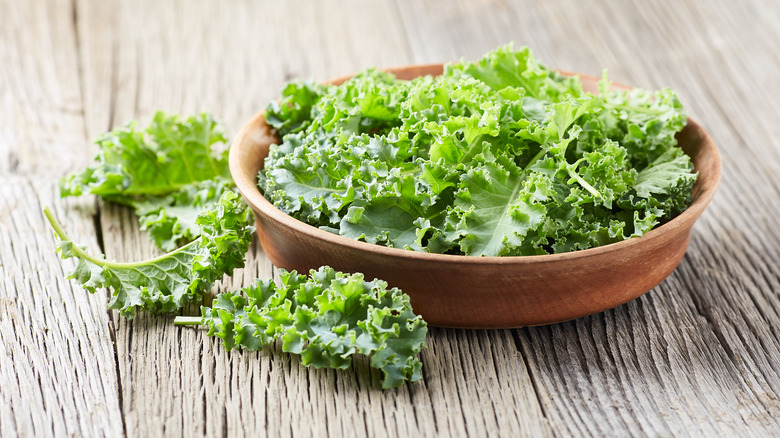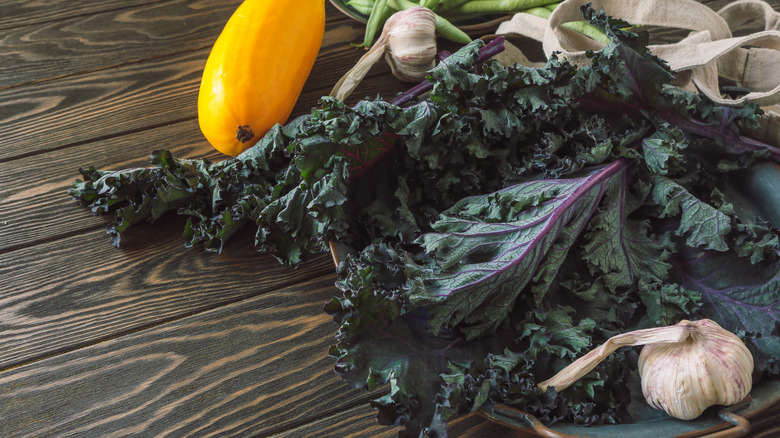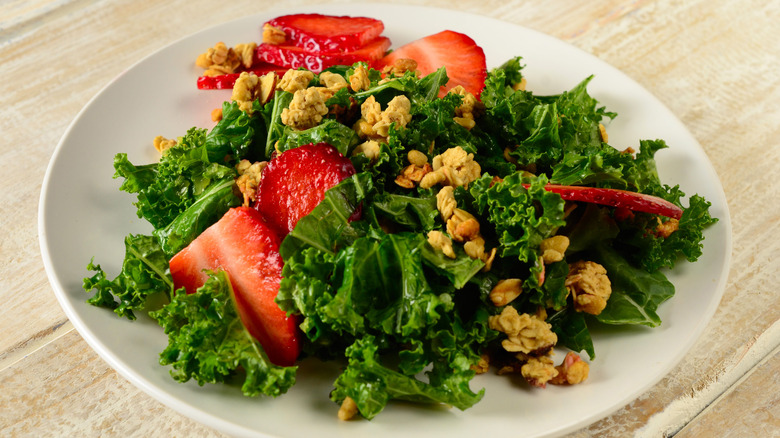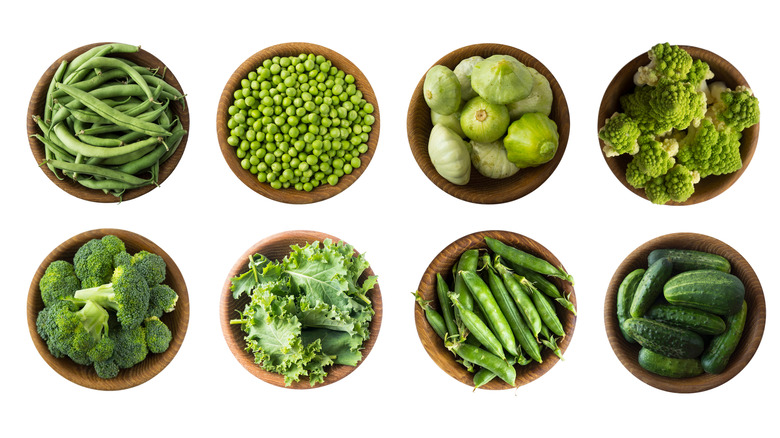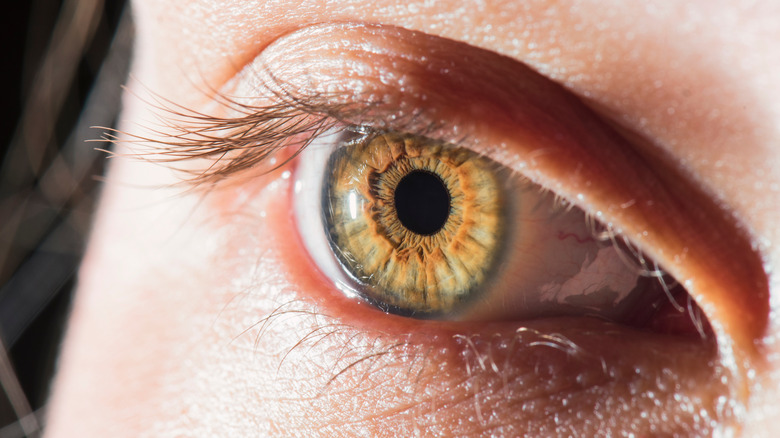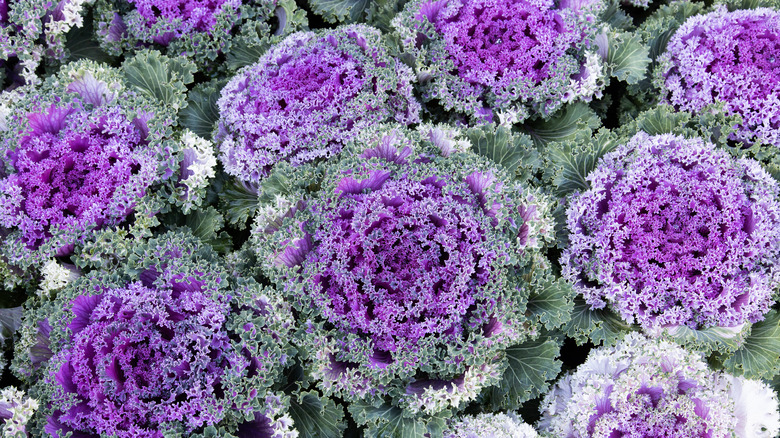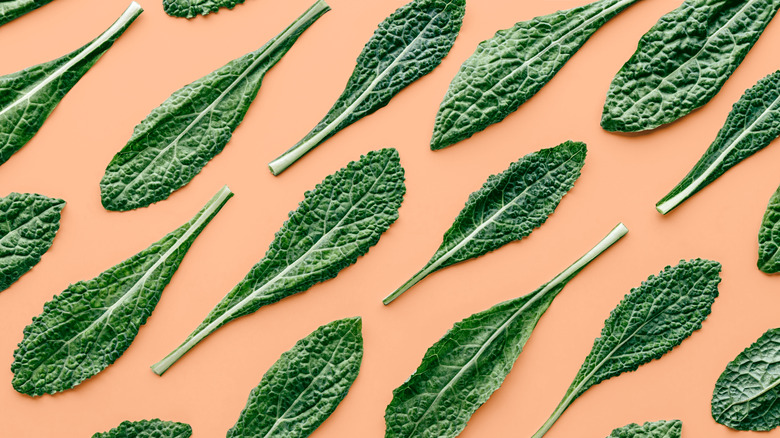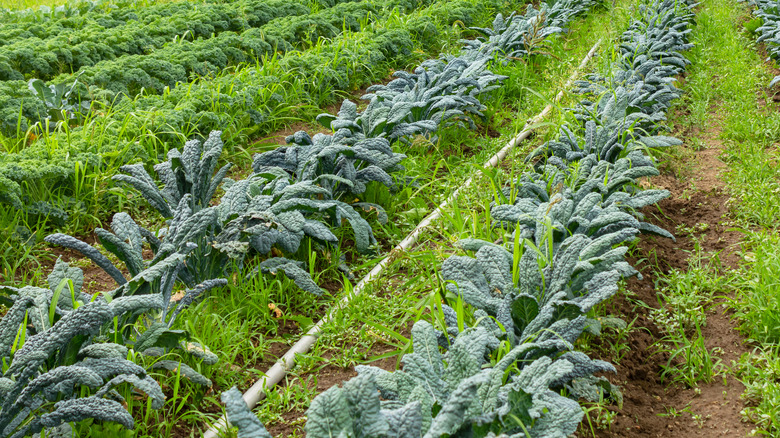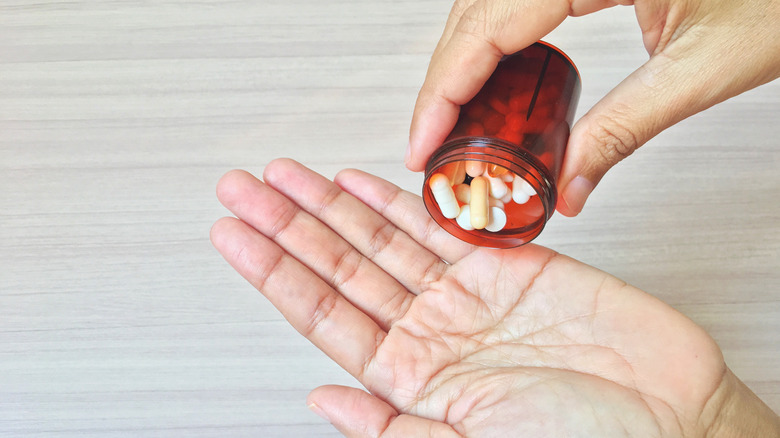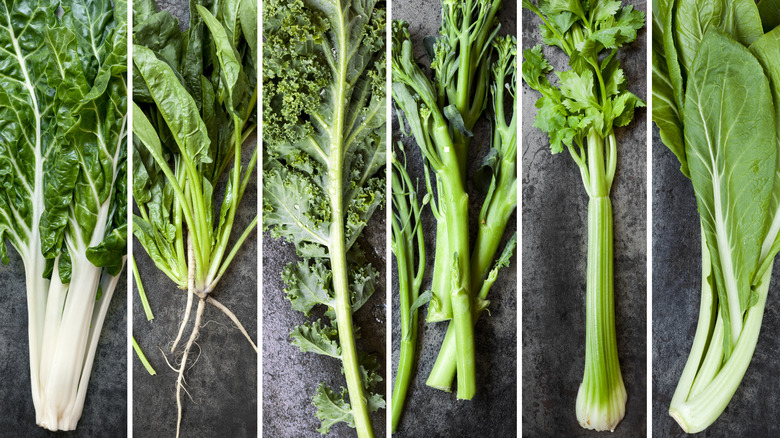When You Eat Kale Every Day, This Is What Happens To Your Body
Many people choose to eat kale every day. After all, kale is likely what you see when you close your eyes and conjure the healthiest food that you can imagine. It's been praised for its excellent nutritional profile, according to Marina Yuabova, a nurse practitioner and assistant professor at CUNY. "Kale is high in nutrients and low in calories, making it one of the planet's most nutrient-dense foods," she explained to The List.
In addition to being good for you, kale can also be prepared in a variety of ways, whether it's raw in a salad, steamed with garlic and a kiss of olive oil, sautéed with other complimentary flavors and textures, or even pureed into a pesto. Indeed kale is quite the versatile vegetable.
Given how good for you kale is, should you eat it every day? And if you're already eating it daily, are you wondering specifically what the advantages and disadvantages might be? Read on to find out exactly what happens to your body when kale makes its way onto your plate at least once a day.
You'll have more energy if you eat kale every day
The human body is a complex organism that runs a lot of processes simultaneously; respiration, digestion, elimination, excretion, and more are constantly occurring at the same time, according to Live Science. And while that takes a lot of energy, choosing to eat kale every day might help you conserve some of that precious fuel, as noted by registered dietitian Kelli Shallal. "You'll feel more energetic because kale supplies many nutrients that support the liver's natural detoxification processes," she told The List. "The less energy spent detoxifying and cleaning up, the more energy you have for other activities." Those other activities could be other bodily functions, or physical activities like walking or cycling.
Kale can also have beneficial impacts at the dinner table if you're looking for a way to maximize your satiety. "You're also likely to feel fuller quicker after a meal with kale in it because kale is high in fiber and water, which are naturally filling," Shallal continued.
You'll get tons of vitamins and minerals if you eat kale every day
Vitamins and minerals are a substances that our bodies must get in order to develop healthily and function normally, according to the National Institutes of Health. So if you're interested in making sure that you ingest those vital building blocks into your system via your daily diet, kale's an excellent way to do it, as noted by registered dietitian Kylie Ivanir. "Kale, along with other dark leafy greens, is packed with vitamins and minerals," she shared with The List. "Compared to other veggies, you get the most bang for your buck in terms of nutrient density."
So what exactly does kale contain that your body requires? "It has vitamins K, C, and B, manganese, calcium, copper, potassium, and magnesium, and iron," she continued. "So if you like to be efficient with your nutrition, kale is a winner!" No wonder they call kale a superfood! Doesn't sound like a bad idea to eat kale every day, does it?
Your gut health may be better if you eat kale every day
It's not exactly polite dinner conversation, but gut health is super important, something that can have a drastic impact on our daily lives if impacted by poor diet or disease. In order to make sure that your digestive health is tip-top, eating a serving of kale every day can help, according to Amanda A. Kostro Miller, a registered dietitian. "You may find improvement in your bowel movements because kale is a fibrous vegetable," she explained to The List. "When we eat fibrous foods, the fiber adds bulk to our stool, making stools easier to pass."
That doesn't mean you should only eat kale every day, or huge amounts of it, as that can have an adverse effect on digestion. Furthermore, Miller also says to make sure you're properly hydrated in order to process the kale easily. "If you find yourself actually constipated after adding more fibrous foods (like kale) into your diet, make sure you also increase your water intake," she continued. "Fibrous foods need adequate water to successfully move through the gut." So, if you're not going as often as you think you should, consider that one of the signs you're not drinking enough water.
Your cardiovascular system may benefit if you eat kale every day
We'll give you the bad news first: Heart disease is a big problem in the United States, as noted by Jamie Hickey, a certified personal trainer and nutritionist. "Most Americans are generally unhealthy, and one of the biggest reasons for this is cardiovascular disease," he told The List. "When plaque buildup causes the lining of your blood vessels to become narrow, a tiny blood clot can cause a heart attack or stroke. When your heart stops beating, that's when the music stops." Um, yikes!
But don't stress too much, as the good news is that there are plenty of things you can do to prevent cardiovascular disease, like quitting smoking and getting regular exercise, according to the American Heart Association. Additionally, eating a healthy diet that includes kale regularly is also super good for your ticker, according to Hickey. "This is where kale plays an important role, due to how it's packed with vitamin C and potassium," he continued. These two nutrients have the ability to manage your cholesterol as well as regulate your blood pressure and heart rate." That makes for a good reason to eat kale every day.
You'll cut down on calories if you eat kale every day
There's no shortage of food available that's high in bad fats and calories, as well as jam-packed with sugar and other refined carbohydrates. But if you ditch the daily fries and soda in favor of a meal that contains lots of kale, that's a good move, as noted by registered dietitian Amanda A. Kostro Miller. "You may be cutting down on calories," she revealed to The List. "If you have recently replaced one of your meals with a kale salad, you may be cutting down on your overall daily calorie intake." And if you eat kale every day, it, of course, could help you lose any excess or unwanted weight.
Indeed kale is super good for you, but Kostro Miller cautions that how you prepare it matters. "Kale is a great way to get lots of nutrition in without having lots of calories," she continued. "However, keep in mind that adding lots of dressing, cheese, meat or nuts/seeds to a salad can quickly increase the calories, so keep those add-ins to small portions."
If you eat kale every day, you could boost your antioxidant level
One of the super great things that eating kale every day can do for you is raise your antioxidant level naturally, and that has benefits for your body, as noted by registered dietitian Rachel Fine. "Lutein and zeaxanthin are the most common antioxidants found in leafy greens like kale," she told The List. "Antioxidants protect our cells against free radicals, which can damage human cells."
But do you have to eat kale raw in order to reap those benefits? As it turns out, no, according to Jaclyn London, a registered dietitian. "In fact, recent research found eating both cooked and raw kale can help you reap the best benefits of Brassica veggies," she penned in an article in Good Housekeeping. "The bottom line still holds: More is more when it comes to kale." She added that lightly sautéing kale in healthy oils like canola or avocado oil can reduce the bitter taste, making it a more pleasant dining experience. So, by all means, follow some of the best ways to cook kale and add in a little flavor to your meals if you want to eat kale every day — try any of the ways to make kale less terrible. Luckily, it turns out there are quite a few recipes that use kale as a secret ingredient.
If you eat kale every day, you may lower your risk of disease
Are you pre-diabetic, or otherwise concerned about developing type 2 diabetes? If so, you might help yourself in your fight against the disease if you eat kale every day, according to Tina Paymaster, a certified health and lifestyle coach and an "ambassador" for National Kale Day. "Kale is rich in sulfur, which is important for detoxification and is necessary for the production of glutathione, one of the most important antioxidants in your body," she explained in an interview with Live Science. "Sulfur is also extremely important for glucose metabolism, helping to decrease the weight gain and the risk of diabetes."
Additionally, those aforementioned antioxidants just might help you ward off certain kinds of cancer, according to Paymaster. "Antioxidants are incredibly important to help remove free radicals from the body that can lead to accelerated aging as well as serious diseases such as cancer," she continued. Specifically, kaempferol, lutein, quercitin, and beta-carotene are the substances that are on the front line against colon, bladder, ovary, breast, and prostate cancers.
Your eyes will thank you if you eat kale every day
Taking care of your eye health should be a priority for you, just as going to the doctor and the dentist are. That's especially important as you grow older, as there are a host of vision problems that can occur later in life. Fortunately if you eat kale every day, you're already taking steps to protect your peepers, as noted by registered dietitian Rachel Fine. "According to Consumer Lab, recent evidence has found that lutein may play an important role in protecting our eyesight by acting on free radicals." And that's a good thing.
It doesn't take a lot of kale to benefit your eye health either, according to registered dietitian Jaclyn London. "Just one cup of kale has more than your whole day's worth of the carotenoids lutein, zeaxanthin, and beta-carotene, which help shield ocular tissues from harmful UV damage and may reduce your risk of cataracts," she wrote in an article in Good Housekeeping.
If you want to up your calcium intake, eat kale every day
Do you have memories of your parents telling you to drink your milk when you were growing up? That's because it's a good source of calcium, according to the National Institutes of Health. That's also certainly something on registered dietitian Kristen Carli's radar, too. "When you think of calcium sources, most people think of dairy," she told The List. "Some plant sources high in calcium are also high in oxalates, which prevent them from being as easily absorbed as dairy products." So it makes sense that people head to the dairy section when they think of foods rich in calcium.
But dairy isn't the only food that's a good source of calcium, as you can also get plenty of the vital substance if you eat kale every day. "Kale is a high calcium and low oxalate food, making it a great source of plant-based calcium for vegans or those who avoid dairy products," she continued. That's good news for our vegan friends.
If you eat kale every day, you might get sick of it
There are clearly a host of reasons to eat kale every day, whether it's to aid digestion, get vital vitamins and minerals, or keep your antioxidant flow going. But there are some drawbacks to eating kale once every 24 hours, believe it or not. For one, you might just get sick of eating the same thing every day, which can happen when you lack variety in your diet.
That's not all either, as noted by registered dietitian Kelli Shallal. "One of the most important things for health is plant diversity, so you don't want to eat the same vegetables every day," she explained to The List. "The different types of plant fibers feed the different species of bacteria in your gut and maintain a balance, which is crucial for gut health and overall health." So don't be afraid to swap out kale on some days for other green vegetables like spinach, broccoli, and Brussels sprouts, to name just a few.
Be careful if you eat kale every day for this reason
Not all kale is created equal, and that's because of what it takes to get kale to grow, thrive, and flourish. If you happen to grow the green in your own backyard garden, chances are that you already know that by now.
But if you're buying your kale at the grocery store, you'll want to take precautions about what kind of kale you buy and how you treat it before serving, according to Kelli Shallal, a registered dietitian. "Kale is a highly sprayed vegetable, and therefore has a significant amount of pesticide residue," she revealed to The List. "If you do consume kale, [choose] the organic kinds and rinse thoroughly!"
That's not to say that organic foods are grown without the use of pesticides, however, as they are, according to Scientific American. So definitely give your greens a good rinse before you consume it just to be on the safe side, especially if you plan to eat kale every day.
If you have an underactive thyroid, choosing to eat kale every day might harm you
Your thyroid might not be the biggest organ in your body, but its function is just as important as any other organ. And if yours happens to be underactive, be careful with your kale consumption, as noted by registered dietitian Andrea Berez. "Kale contains a compound called goitrogens that can block iodine from entering the thyroid gland, effecting overall metabolism negatively," she told The List. "Those with hypothyroidism are at risk for further iodine absorption impairment and should be careful not to consume too much kale." So if you have hypothyroidism and you're wolfing down a kale salad every day at lunch, you might want to stop in your decision to eat kale every day until you talk to your doctor.
But if your thyroid is normal, you really don't have anything to worry about, according to Jamie Hickey, a certified personal trainer and nutritionist. "This will mainly affect people who have an underactive thyroid," he shared with The List. "if you have a healthy thyroid, you would have to eat an absurd amount of kale to bring any negative attributes about."
If you're on certain medicines, it might be risky to eat kale every day
If there's one thing that kale takes the gold medal for, it's the amount of vitamin K that it contains. According to Healthline, one cup of raw kale contains a whopping 684 percent of your daily vitamin K requirement. So if you eat kale every day, you're more than set in that department.
But not everyone should be rejoicing about that fact, according to registered dietitian Andrea Berez, who cautions that if you eat kale every day it can cause an adverse interaction with certain medications. "Vitamin K has a unique action that assists in blood clotting and can interfere with the effects of some blood thinners," she revealed to The List. "Those on blood thinners should consume a consistent amount of vitamin K or no vitamin K at all to avoid food-drug interaction." As always, talk to your doctor if you're concerned.
Remember: you don't have to eat kale every day
Finally, if you find yourself eating kale daily but the thrill is gone, take heart: You don't have to eat kale every day, according to Tamara Duker Freuman, a registered dietitian. "Green leafy roughage make you feel rough? I absolve you from the 11th commandment, 'Thou Shall Eat Kale,' and suggest you get your folate from cooked beets, avocados or peanut butter, and your vitamin A from cantaloupe, roasted butternut squash, or a carrot ginger soup," she penned in an article in Self. So there really are other options when it comes to foods you should start eating every day.
This is excellent advice if you find yourself eating kale simply because you think you're supposed to. "The first step in liberating yourself from unhealthfully-limiting beliefs about what you should be eating is to broaden your mindset around what constitutes a healthy diet," Freuman continued," adding, "No single food in our diets needs to carry the weight of delivering the entire supply of a single nutrient, nor is there any single, essential 'superfood' we all must eat..."
That said, if you're mowing down kale at dinner every night and your doctor is fine with it, by all means, keep doing what you're doing.
